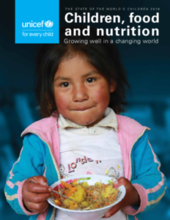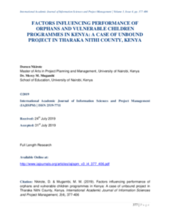Displaying 61 - 70 of 243
This edition of The State of the World’s Children report examines children, food and nutrition. It seeks to deepen understanding around the causes and consequences of children’s malnutrition in all its forms and to highlight how governments, business, families and other stakeholders can best respond.
For this study, the authors carried out a retrospective review of looked-after children and young people (LACYP) caseloads in North Somerset Local Authority between Jan and Dec 2018 to ensure national standards are being met and provide a benchmark for future quality improvements.
The purpose of this commentary is to reflect on the utility and possible application of the suggestions and study designs in this special issue to real‐life intervention studies in dynamic context settings.
Decades of research confirm that children and adolescents in out‐of‐home care (foster family, residential care) have much greater healthcare needs than their peers. A systematic literature review was conducted to evaluate organizational healthcare models for this vulnerable group.
This advocacy brief from SPOON Foundation notes that successful nutrition interventions are not reaching the children who are at highest risk, including children without family care and children with disabilities, and outlines four key actions that can help to ensure that children without family care and children with disabilities have opportunities to grow and thrive.
The purpose of this systematic review is to synthesize existing research on community- and home-based interventions designed to improve parenting and reduce risk of maltreatment for families with substance-exposed newborns (SENs), applying a program logic framework.
The Breastfeeding Advocacy Toolkit (the Toolkit) is intended to ensure stakeholders are able to easily access and use advocacy tools aimed at improving policies and financing for the protection, promotion, and support of breastfeeding.
The purpose of this study was to describe the role of Public Health Nurses (PHN) addressing the needs of children and adolescents in foster care.
In this case study, the authors address a critical component of health care delivery for a vulnerable population by describing a process of developing an information sharing system between health care and child welfare organizations in collaboration with child protection community partners in the US.
The purpose of this study was to investigate factors influencing performance of orphans and vulnerable children Programmes in Kenya focusing on unbound project in TharakaNithi County, Kenya.




